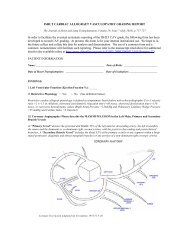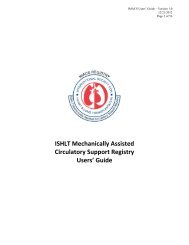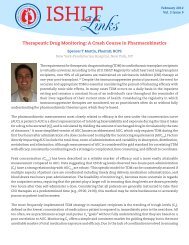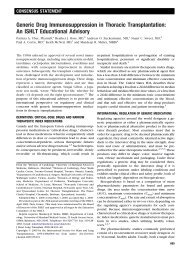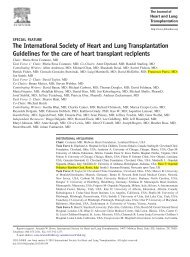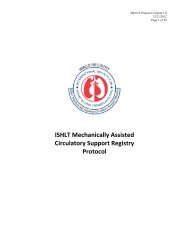Task Force 4: Inpatient Management of Patients with MCSD - The ...
Task Force 4: Inpatient Management of Patients with MCSD - The ...
Task Force 4: Inpatient Management of Patients with MCSD - The ...
You also want an ePaper? Increase the reach of your titles
YUMPU automatically turns print PDFs into web optimized ePapers that Google loves.
appointments after discharge from MCS implant, it is imperative to address<br />
psychological disorders during the index hospitalization.<br />
Physical <strong>The</strong>rapy/Rehabilitation/Occupational <strong>The</strong>rapy. Evidence suggests that<br />
early mobilization and progressive exercise training in MCS patients is safe and reduces<br />
adverse events. 61 <strong>The</strong> patient should be assessed by physical therapy/occupational<br />
therapy as soon as the patient is medically stabilized post operatively and transferred to<br />
the non-ICU setting. A specific rehabilitation plan should be established <strong>with</strong><br />
documentation <strong>of</strong> goals. Prior to discharge from the hospital following MCS<br />
implantation, patients should exhibit hemodynamic stability <strong>with</strong> exertion. In addition to<br />
in-hospital exercise training provided by physical therapists, occupational therapists can<br />
assess and assist patients <strong>with</strong> fine motor skills, which are important in “hands on”<br />
device management, and return to activities <strong>of</strong> daily living, including use <strong>of</strong> MCS shower<br />
kits. <strong>Patients</strong> who are unable to meet these goals in the hospital may need referral to an<br />
inpatient rehabilitation facility which is able to support MCS patients.<br />
Palliative care. Finally, an important member <strong>of</strong> the MCS multidisciplinary team a<br />
provider <strong>of</strong> palliative care. Palliative care is focused on relief <strong>of</strong> symptoms and holistic<br />
interdisciplinary support for the patient and their family 62 . During the informed consent<br />
process, palliative care services (e.g., management <strong>of</strong> distressing symptoms, provision<br />
<strong>of</strong> psychological and spiritual support, and provision <strong>of</strong> support to caregivers) can be<br />
shared, regardless <strong>of</strong> whether patients choose MCS or medical therapy. 62,63 End <strong>of</strong> life<br />
and device deactivation may also be useful to discuss at the time <strong>of</strong> informed consent,<br />
especially for DT patients. 63,64 After <strong>MCSD</strong> implant, in-hospital palliative care services<br />
may include symptom relief, especially management <strong>of</strong> pain, and psychosocial support.<br />
If a catastrophic complication <strong>of</strong> MCS occurs prior to discharge, palliative care team<br />
members may play a more prominent role in patient management, including providing<br />
patient comfort measures and supportive care, and helping family members <strong>with</strong> coping,<br />
anticipatory grief counseling, and elective device deactivation to allow for a natural<br />
death. 65,66<br />
19







